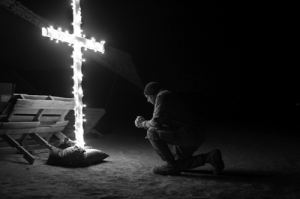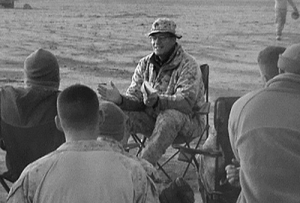In Iraq Allawi Deals and Christians Flee
BY Herschel SmithAllawi has apparently made a deal with Maliki to form a unity government in Iraq. This is good news, good to the extent that Allawi will be involved, and Maliki – good friend of Iran – will apparently be somewhat neutered. But actions and decisions have consequences. In fact, some decisions have effects that come calling on our conscience years after they are made. Supporting Maliki, leaving Sadr alive and the pitiful SOFA under which U.S. troops labor are such decisions.
There is an increase in foreign fighters flowing into Iraq, and it isn’t apparent that the ISF are any match for them.
Despite the fact that the U.S. military insists Iraqi security forces are ready to handle their own security as American troops withdraw from Iraq, one U.S. commander says glaring mistakes were made by Iraqis during a recent battle.
Lt. Col. Bob Molinari of the 25th Infantry Division based in Hawaii says the fight in the eastern Iraqi province of Diyala, now being called the Battle of the Palm Grove, involved hundreds of Iraqi soldiers, U.S. ground troops and American fighter planes dropping two 500-pound bombs — all to combat just a handful of insurgents. And in the end, the enemy got away.
Molinari says the troubles in the palm grove started when local residents reported that insurgents affiliated with al-Qaida had assembled there to build bombs. An Iraqi commander led a unit of Iraqi soldiers in to investigate.
Molinari says Iraqi commanders from a total of seven different units showed up at the scene. Even the minister of defense was there. Molinari says too many commanders meant no coherent plan of action.
Iraqi soldiers were sent into the grove, in single file, each headed by an officer, Molinari says. The insurgent snipers would simply take aim at the officer who was leading each column.
“It was a matter of, as soon as the officers went down, the [Iraqi soldiers] went to ground. They didn’t know what to do next,” Molinari says.
The Iraqi soldiers fled from the palm grove and requested American firepower, Molinari says. So the Americans employed bombs, mortars, grenades and special forces. But the enemy only hid in drainage ditches, waited, then came out again, shooting.
In all, five Iraqis were killed and 13 were wounded. Two Americans were wounded as well. By the second night of battle, the Iraqis had ordered a full retreat from the palm grove.
After the battle, Molinari and the Iraqi commander in Diyala decided to set up a monthlong training session based on what went wrong in the Battle of the Palm Grove. The training is taking place in another palm grove that was once a vacation home for a commander in former Iraqi dictator Saddam Hussein’s army.
On the first day of training, Molinari’s men draw diagrams of how soldiers should move in diagonals, not straight lines.
Iraqi Lt. Gen. Tariq Abdul Wahab Jassim acknowledges that Iraqi soldiers made mistakes in the Battle of the Palm Grove and asks what to do differently next time.
Molinari responds that the Iraqis should have sent in just one platoon with one commander. And, he says, the Iraqis should never have given up their ground.
“Once the firefight starts, you do not break contact with the enemy,” Molinari says. “You continue to focus on him, and if you cannot maneuver, other forces come in — until he’s dead.”
After the question-and-answer session, Molinari’s men move into the trees to demonstrate how it’s done. A loudspeaker simulates how a message would be sent to civilians to evacuate the area before the fight begins.
American soldiers fire blanks at a simulated enemy target. The unit’s spokesman, Maj. Gabe Zinni, says this is the kind of training that any American soldier would receive before going into combat.
“These are … fundamentals,” he says. “Absolutely.”
In other words, if the enemy is hiding in a densely wooded area and shooting at you, advance on him and keep firing at him, while more of your men sneak around and attack him from the side or from behind.
In the end, it turns out that only four or five insurgents were fighting in the Battle of the Palm Grove.
And despite the efforts of hundreds of Iraqi soldiers, about 50 American soldiers, and massive firepower, the insurgents eventually managed to escape from the palm grove.
In the wake of Islamic militancy on the part of not only the foreign fighters coming into Iraq, but also the militant, pro-Iranian elements within Iraq, Iraqi Christians are fleeing North.
At a time when Christians in various parts of the Muslim world are feeling pressured, Iraqi Christians are approaching their grimmest Christmas since the U.S.-led invasion of 2003 and wondering if they have any future in their native land.
They have suffered repeated violence and harassment since 2003, when the interreligious peace rigidly enforced by Saddam Hussein fell apart. But the attack on Our Lady of Salvation in which 68 people died appears to have been a tipping point that has driven many to flee northward to the Kurdish enclave while seeking asylum in the U.S. and elsewhere.
What seemed different this time was the way the gunmen brazenly barged onto sacred ground, the subsequent targeting of homes by bombers who clearly knew every Christian address, and the Internet posting in which al-Qaida-linked militants took responsibility for the church attack and vowed a campaign of violence against Christians wherever they are.
Moqtada al Sadr continues to make trouble, but this time he is beclowing himself. He has banned his followers from accepting work from foreign oil companies. This will likely only do harm to his standing and that is a good thing. But it does go to show that Sadr is nothing if not persistent in his anti-Americanism.
Whether getting in bed with criminals like Ahmed Chalabi, supporting Iranian lackey Maliki, laboring under a Status of Forces Agreement that has U.S. troops locked down as if under house arrest, allowing Iranian influence to go relatively unchecked in Iraq, or leaving Sadr alive after he was actually in the custody of the 3/2 Marines in 2004 and released in a tip of the hat to the British notion of soft counterinsurgency tactics, the situation in Iraq today can be directly traced, at least to some extent, to decisions made during Operation Iraqi Freedom.
To say like so many Americans do that “We have given them a chance at freedom and if they screw it up it’s on them” simply doesn’t work. We stacked the deck against them by leaving al Qaeda intact enough to cause regime destabilization, allowing Iran unmolested access to Iraq, leaving Sadr alive to cause regime destabilization, and leaving the Christians to the designs of the Islamic militants.
Thus do we bear at least some of the moral responsibility for the suffering today, in spite of the fact that we didn’t actively perpetrate the evils. Pay close attention to these things. History may be very hard on our decisions, and we should learn from this example for all such counterinsurgency efforts in the future.






